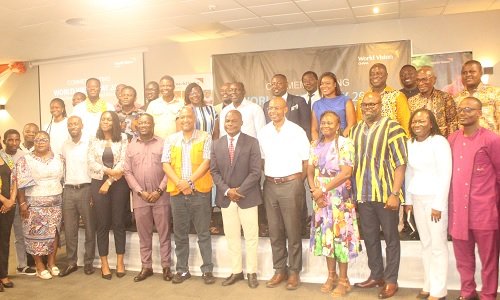News
Local Government Minister reveals government’s intention to revive the National Sanitation Day initiative

The Minister for Local Government, Chieftaincy and Religious Affairs Ahmed Ibrahim has revealed government’s intention to revive the National Sanitation Day initiative.
The day he said forms part of efforts to combat water pollution and ensure sustainable access to safe drinking water in Ghana.
Speaking at the 2025 World Water Day media engagement and panel discussion, organized by World Vision Ghana in partnership with other stakeholders in Accra on Tuesday, he highlighted the critical link between water and sanitation stressing the need for a collective approach to prevent the contamination of the country’s water bodies.
Mr Ahmed Ibrahim urged metropolitan, municipal, and district assemblies (MMDAs) to implement comprehensive and sustainable strategies to foster positive attitudes toward water, sanitation, and hygiene (WASH) in their communities.
He emphasized that without a change in behaviour, investments in WASH initiatives would not achieve their intended impact.
“One of the major barriers to sustainable water service delivery is the poor attitude of citizens. Therefore, I encourage MMDAs to develop and implement sustained behavioural change strategies,” Mr Ibrahim stated.
Mr Ibrahim also highlighted the importance of data in planning and executing WASH interventions effectively.
“MMDAs must be innovative in attracting additional resources and should also familiarise themselves with relevant sector policies and strategic documents,” he advised.
He assured that the ministry remained committed to ensuring the proper dissemination of these policies to enhance the capacity of MMDA staff.
“We are dedicated to working with all stakeholders to guarantee access to safe drinking water and improved sanitation for all, promoting both good health and socio-economic development,” he added.
The minister further stressed the importance of inter-ministerial coordination to harmonise data and find solutions to WASH service challenges.
He also called for a national conversation on corporate social responsibility (CSR) and its impact on corporate taxation.
“It is crucial to evaluate CSR initiatives to ensure they genuinely contribute to societal well-being,” he noted, adding that this would foster accountability among companies regarding their social and environmental impact.
The National Director of WVG, Jean-Claude Mukadi, reaffirmed the organisation’s commitment to collaborating with the government and stakeholders to address challenges in access to safe drinking water.
He urged the government to increase investment in WASH programmes to ensure universal access to clean water, especially for children.
“Through World Vision’s efforts, we have completed and commissioned 958 boreholes with hand pumps across various communities. Additionally, we have delivered 197 solar-powered mechanised water systems and provided 368 schools and 157 healthcare facilities with safe drinking water sources,” Mr. Mukadi stated.
Development Geographer at the University of Cape Coast, Professor Simon Mariwah, expressed concern over the declining investment trend in WASH
By Benedicta Gyimaah Folley